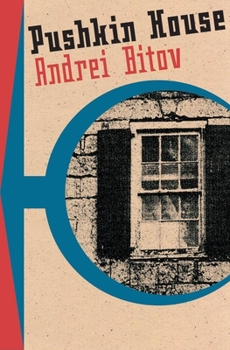Pushkin House
Select Format
Select Condition 
Book Overview
No other contemporary novel provides such clear insight into the Russian mind and way of life as Andrei Bitov's Pushkin House . First published in the United States in 1987 and highly praised for its inventiveness, Pushkin House is a contemporary literary masterpiece. Though the novel's focus is a love affair between Lyova and Faina, the novel's true subject is an investigation of the corruption of Soviet intellectual life and history. Working within...
Format:Paperback
Language:English
ISBN:156478200X
ISBN13:9781564782007
Release Date:December 1998
Publisher:Dalkey Archive Press
Length:384 Pages
Weight:1.48 lbs.
Dimensions:1.1" x 6.0" x 9.0"
Grade Range:Postsecondary and higher
Customer Reviews
2 ratings
disorientation, nature of 'reality', identity, Russian canon
Published by Thriftbooks.com User , 17 years ago
Pushkin House is a novel full of fiery intelligence and is a work of formidable complexity. It is not until page 92 that the reader is informed by A. B., Andrei Bitov's alter ego, that the novel is 'about disorientation', by which time I, the reader, was thoroughly disoriented. The experience of the young hero of Pushkin House, Lyova Odoevtsev, when inebriated, or lurching drunkenly between moments of clarity and a clouding over of understanding corresponded closely with my own experience of reading this novel. Pushkin House is the name of the literary institute in which the hero works. It is also Russian literature as a whole ('the house that Pushkin built'). It is also this book itself, which houses not only Pushkin, but also Gogol, Lermontov, Dostoyevsky, Turgenev, Tolstoy, Tyuchev and Chernyshevsky. The book is crammed with allusion to all these writers, together with seemingly bizarre metaphors and ludic liberties on the part of the author. These all serve to compound the reader's feeling of disorientation. Bitov's work is metafictional in nature. He uses text and fragments from works of different writers of the Russian cannon and also the works of fictional characters within the framework of the story, as well as chapters in which the narrator discusses the process of creating his hero and deconstructs the common methods of writing novels, thus entering into dialogue with other writers. This use of metafiction creates a multi-layers mirror of reflection and refraction in Bitov's text. The text uses many allusions, associations, situations, characters, themes, literary forms from the works of writers and self-quotations in accord with established literary tradition. To quote James Zebroski in his book review of Pushkin House 'the first impression of an informed western reader exposed to Pushkin House is that the author seems to have used the subversive literary devices of every post-modern writer he has read as well as some he has not'. Bitov's critique on concepts of reality and his experiments with alternative approaches to his hero's life, and speculations on their relative truth and reality, are necessarily involved and non-linear, and so contorted and self-subverting that any summary account of it is bound to be misleading. Indeed, this method of critique contributes to the readers overall disorientation, as reality and realism itself is being examined. But Bitov names his hero, Lyova, as 'a thoroughly contemporary young man', whose life boundaries are also historical boundaries, indicating that he is commenting on comtemporary Soviet life at the time of writing.
Clean, Well-cut Russian Diamond in the Rough
Published by Thriftbooks.com User , 24 years ago
Bitov, as one of the original members associated with the Metropol group (imagine a Bloomsbury in the former Soviet Union whose members faced very real consequences for expressing their views), a literary and arts association whose works literally transcended the unthinkable oppression, survives as do Aksyonov and Ratushinskaya. Pushkin House, which takes place in Petersburg, is as Nabokovian yet expressive as they come. The book assumes the guise of a sort of collage, expertly pieced together with incident and memory, the effect being something like studying the dizzing yet always stable and infinite array of refractions emerging from a well-cut gem when held up to the light. For anyone interested in or seriously studying Russian history or literature, Pushkin House, along with Solzhenitsyn, Aksyonov or Brodsky is essential; The book to end all nomenklaturas. A joy to recommend as much as to read





